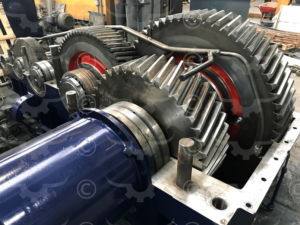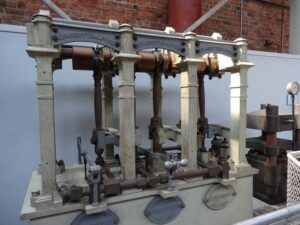Centrifugal pumps are widely-used across various industrial and domestic operations due to their ease of use and maintenance, simplistic design, and high efficiency. There are several types of centrifugal pumps – varying in size, capacity, and functionality.
But what are centrifugal pumps used for?
Let’s take a closer look at what centrifugal pumps are, how they work, their advantages and disadvantages, the different types of pumps, and when to use a centrifugal pump.
What is a Centrifugal Pump?
A centrifugal pump is used to move water and other low viscosity liquids with the assistance of centrifugal force. The pump uses a motor that converts electric energy into mechanical energy. This energy initiates the rotation of the pump’s impeller and helps move the liquid from a lower to a higher level.
Main Centrifugal Pump Parts
Below are some of the centrifugal pump’s main parts:
- Impeller: The impeller is the rotating part responsible for transmitting the kinetic energy to the liquid. The impeller comes in different sizes and is comprised of two or more curved vanes, based on the pump’s capacity.
- Casing: The impeller goes into an air-tight spiral-shaped casing. The casing forms a chamber, where the water’s kinetic energy is converted to pressurized energy before being moved to the discharge pipe.
- Shaft: The pump shaft is directly connected to the motor shaft, transmitting energy from the motor to the impellers.
- Shaft seal: A seal is installed between the pump shaft and the pump casing to ensure adequate insulation.
- Shaft sleeve: This is a stainless steel or bronze sleeve that slides onto the shaft. The sleeve’s role is to protect the shaft and ensure the impeller is positioned correctly.
- Bearings: The bearings reduce the friction of the pump’s moving parts and ensure smooth rotation.
How does a Centrifugal Pump work?
We now have a basic understanding of the anatomy of this mechanical device, but how does a centrifugal pump work?
- As soon as the centrifugal pump begins operation, it begins sucking water in through a suction nozzle (also known as an “eye”) located in the center of the impeller.
- The water is then caught up in the impeller’s vanes which are rotating at a high speed. This circular motion guides the water outward and increases the fluid’s velocity and pressure.
- The water is then transported to the centrifugal pump’s casing, where the pressure is further increased through diffusion.
Types of Centrifugal Pumps
There are a variety of centrifugal pumps which differ based on how they are setup and the number of impellers they have. The types of centrifugal pumps are:
- Single-stage: This is a centrifugal pump with one impeller. It’s suitable for high-flow and low to medium pressure pumping.
- Two-stage: With two impellers, this centrifugal pump type is suitable for medium-head operations.
- Multi-stage: With three or more impellers, this pump can sustain high-head capacity.
When considering the impellers, they can be either:
- Open: This type of impeller is the least strong as its vanes are free (not surrounded by any walls). They’re mostly used in smaller pumps and for liquids with suspended particles.
- Semi-open: Such impellers usually have a back wall which adds strength to the vanes. This type of impeller is efficient and is used in medium-sized pumps which handle liquids with a small number of suspended particles.
- Closed: The vanes are closed from both sides. This impeller type is highly efficient but it’s also the costliest. Closed impellers are used only for clear liquids.
Based on the volute type, pumps can be:
- Single volute: This type of pump has one smaller-sized volute passage. It’s most efficient for small to medium capacity operations.
- Double volute: Most pumps have a double volute design. The two partial volutes are arranged at a 180-degree offset from one another, providing a better balance for the flow of the fluid.
Based on the shaft position:
- Horizontal: Pumps with a horizontal shaft orientation are easier to service and maintain.
- Vertical: The shaft is positioned vertically. This type of pump usually requires a bigger space for installation and servicing.
When to Use a Centrifugal Pump?
Centrifugal pumps have many applications and can be used across a wide range of industries. But what are centrifugal pumps used for?
Centrifugal pumps can be integrated into residential buildings for:
- Residential water supply
- Fire protection systems
- Air conditioning systems
- Hot water circulation
- Sewage drainage
Centrifugal pumps also have various applications in the following industries:
- Oil and gas: pumping oil
- Waste management: processing wastewater
- Agriculture: irrigation systems
- Energy: industrial power generation plants
- Food and beverage production: sugar refining
- Chemicals: production of paints, petrochemicals, etc.
- Mining: separating minerals from the soil
Centrifugal Pumps Advantages and Disadvantages
The main advantages of a centrifugal pump are:
- The provision of the most efficient method for moving a high volume of low viscosity liquids.
- The motor chamber and the pump chamber are separated which ensures the motor gets proper cooling.
- The fluid is pumped without any leakage since there are no drive seals.
- All the motor power goes into the pumping process.
However, there are also some disadvantages you should consider before deciding on a centrifugal pump:
- Centrifugal pumps are not suitable for high viscosity liquids.
- The impeller can wear out and worsen if in contact with different suspended fluids.
- Depending on the type of fluid, corrosion might occur.
- If the flow is too low, the pump might overheat.
- Most centrifugal pumps need to be submerged into the liquid before starting operation.
- Centrifugal pumps are usually sensitive to external conditions such as excessive vibration, the pressure of the liquid before it gets into the impeller, and cavitation.
All of these factors can worsen the centrifugal pump’s performance and even lead to breakage. So, before you get your pump unit up and running, make sure to set up all the right conditions and conduct regular checks and maintenance to avoid any major breakages.
Houston Pump and Gear: A Reliable Industrial Pumps Service
Making sure your centrifugal pump is well-maintained and serviced can take a lot of your time and resources. So, if you’re not sure how to do it yourself or just want reliable industrial pump service, contact us! Houston Pump and Gear offers both industrial gearbox repair and pump repair in Houston across the US, Canada, and Mexico.




